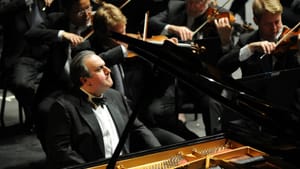Stay in the Loop
BSR publishes on a weekly schedule, with an email newsletter every Wednesday and Thursday morning. There’s no paywall, and subscribing is always free.
Dust devils and Rachmaninoff
The Philadelphia Orchestra presents Yefim Bronfman at the Academy of Music

Under the direction of Yannick Nézet-Séguin, the Philadelphia Orchestra’s first subscription concert of 2020 was held this weekend at the Academy of Music, a couple blocks up Broad Street from the ensemble’s Kimmel Center home base. The Academy is looking fine and sounds even better, as though each note were cupped in the hands of the goddess of music herself, and offered with love and affection to every listener.
A staggering variety of musical emotions
The program began with Dust Devils, a strikingly original and exciting work by Canadian-born composer Vivian Fung. A better name for this work could not be chosen. While it is not program music per se, the swirls and gyrations of notes in space, bandied among instruments, does replicate the impish pirouettes of dust devils, tiny whirlwinds caused when a pocket of air near the surface of the ground rises suddenly into cooler air, resulting in an updraft. Some dust devils are weak and others have the force of a tornado—not unlike our thoughts, the composer seems to say.
Though only 10 minutes in length, the work offers a staggering variety of musical emotions, and, in three continuous movements, gives the impression of a symphony or other large-scale orchestral work. The spiky, nervous chirping of woodwinds and violins alternates with the deep grrumph of the cellos, among other delightful aural effects. The overall impression is of balance and form, but with so much fun going on in between. Fung, the composer of more than 60 works, was present to step on stage and receive a well-deserved ovation.
Deflecting the blaze
The second work on the program featured Orchestra staple Yefim Bronfman in the season’s first BeethovenNOW selection, the Piano Concerto No. 4 in G major, Op. 58. This year marks Beethoven’s 250th birthday, and the Philadelphia Orchestra is pulling out the stops, presenting all nine symphonies and five piano concertos with leading solo artists.
A US citizen born in what is now Uzbekistan, Bronfman is celebrated for his mature vision; steady, reliable tone; and respect for the integrity of the music he performs. This was all apparent in a calm, reflective performance of, to me, Beethoven’s most thrilling concerto. The Fourth premiered in Vienna during the famous “Monster Concert” just before Christmas 1808, when Beethoven was 38 and raging against the fate leading him toward total deafness. (That program, spread over four hours in an icy theater, also included premieres of the Fifth and Sixth Symphonies, among other works.)

Rather than communicating the turmoil that consumed the composer’s life at this time, this performance had more of a measured intent to contain and deflect a potential blaze. And yet there was much to appreciate and enjoy. The conversation between soloist and orchestra in movement two was especially effective, and one wonders whether this kind of musical dialogue influenced the composer’s last quartet (“Must it be? It must be!”) nearly 20 years later. Even the shift to a faster tempo near the end of the final movement was pensive rather than urgent. Not for this pianist the trend toward hair tossing, nearly falling back off the bench, sweating onto the keys, or wearing scanty attire. The performance clearly articulated the classical structure of this revolutionary work, delineating the method that could have so easily turned to madness.
Spectacular Rachmaninoff
The program concluded with a spectacular performance of Rachmaninoff’s Symphony No. 3 in A minor, Op. 44. Here, all the emotion pent up in the Beethoven rushed out in sweeping abandon. This, the composer’s final symphony, premiered with the Philadelphians under the direction of Leopold Stokowski on the same Academy stage.
Nézet-Séguin is never better than when eliciting great sheets of sound, seeming to pull them physically out of the orchestra, with just the right emotional pitch from the exemplary musicians of this ensemble. Rachmaninoff’s particular affection for the Philadelphia Orchestra throughout his life surely inspired this spirited and spiritual interpretation. Have lovelier pairings of harp and flute been composed since Mozart? The solo violin passages in the second movement have never sounded better than under the bow of concertmaster David Kim.
The symphony itself may at times seem a bit fragmented and disjointed, as though the composer didn’t know what to do with all the melodic themes pouring out of his inventive mind, but a great performance can smooth over the rough spots. The Rachmaninoff was recorded live during this performance for future release, and it will be well worth waiting for.
What, When, Where
BeethovenNOW: Yefim Bronfman. Vivian Fung, Dust Devils; Ludwig van Beethoven, Piano Concerto No. 4 in G major, Op. 58; Sergei Rachmaninoff, Symphony No. 3 in A minor, Op. 44. Conducted by Yannick Nézet-Séguin. Yefim Bronfman, piano. The Philadelphia Orchestra. January 23, 24, and 26, 2020, at the Academy of Music, 240 S. Broad St., Philadelphia. (215) 893-1999 or philorch.org.
The Academy of Music is a wheelchair-accessible venue. For more information about the accessibility of Kimmel campus venues, call Patron Services at (215) 893-1999 / (215) 875-7633 TTY or email [email protected].
Sign up for our newsletter
All of the week's new articles, all in one place. Sign up for the free weekly BSR newsletters, and don't miss a conversation.

 Linda Holt
Linda Holt